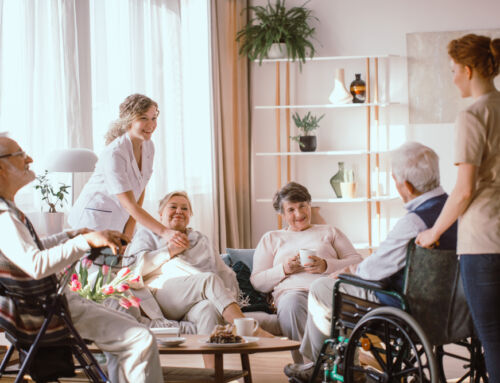Many older Americans worked hard for decades, rarely taking time off. This is why one of the activities that people often look forward to with their retirement is having the freedom to travel. So that raises the question: Is it safe for seniors to be travelling right now? Or should seniors hit the breaks on leisure travel plans amid the current pandemic?
Key travel-related considerations
While cancelled plans are disappointing, it is understandable that many don’t want to take the risks and/or deal with the inconveniences that may accompany travel these days. There are several factors that seniors may want to take into account if you have upcoming travel plans or are considering scheduling a trip.
Risks associated with age and underlying health conditions
First and foremost, we know that seniors have a higher risk for severe illness if they contract COVID-19, according to the CDC. People in their 60s or 70s are at higher risk for severe illness than those in their 50s, for instance. And data shows that people who are 85 or older are at the greatest risk for severe illness from COVID-19.
Those with certain underlying health conditions are also at a greater risk for a serious case should they contract COVID-19. Several health issues that are common in older people, such as high blood pressure, cancer, and diabetes, are on the list of comorbidities that can result in serious COVID-19 complications.
If you have travel plans, you may want to weigh the risks associated with your age and any underlying health conditions you may have should you contract COVID-19. Especially if you plan to travel somewhere that has significant rates of community spread (e.g., with a COVID test positivity rate of higher than a 10 percent over a seven-day rolling average), it may be worth exercising a little extra caution and postponing your trip.
Mandatory state or country quarantines
Another consideration with travel right now is state-mandated quarantine restrictions. These are precautionary guidelines that have been put in place by some states with the goal of preventing the spread of COVID-19 from out-of-state travelers.
For example, New York currently requires visitors from more than 30 states to complete a two-week quarantine when entering New York State. Likewise, if a New Yorker travels out of state to one of those 30+ places, they must then quarantine for two-weeks upon their return home. Failure to follow these rules could result in fines and even legal proceedings.
If you have domestic travel plans, you will want to be sure you understand any quarantine restrictions that are being mandated by that state. It could be that you will have to spend your entire trip holed up in your hotel room in order to adhere to the guidelines.
As for international travel, there are few countries that are currently allowing Americans to enter, given our nations’ high COVID numbers. The European Union will not permit us to enter; even Canada and Mexico have closed their land borders to us. Some Caribbean countries are beginning to allow Americans, though some do require a negative COVID test. Other countries are considered “high risk” because they are struggling with their own COVID-19 outbreaks. You can see a list of countries and their various travel restrictions here.
Restrictions for senior living community residents
Many age-restricted communities across the U.S. put these visitor restrictions in place in the spring with the goal of preventing a COVID-19 outbreak among their residents. If you are currently living in a senior living community, such as a continuing care retirement community (CCRC or life plan community), you may have already been living with such tight visitor restrictions.
But these restrictions also make travel outside of the community an issue. Depending on the specific restrictions put into place, if a resident opts to leave the grounds, or in some cases, leave the city or state, they will be required to complete a 14-day quarantine inside their residence upon return to the community. As a result, residents must weigh the costs and the benefits of travel.
Should I stay or should I go?
Based on what we currently understand about the spread of COVID-19, the more people you interact with, the more closely you interact with them, and the more time you spend together, the higher your risk of contracting COVID-19 should they unknowingly be infected. That’s why the CDC recommends limiting your interactions with people outside of your household members and keeping at least six feet between yourself and others, especially if you are indoors.
If you are still thinking about travelling for leisure or to see family and friends, here are some ways the CDC suggests seniors can make their trip as safe as possible.
- If travelling by air, wear a mask in the airport and throughout your flight. Consider bringing sanitizing wipes to clean off high-touch surfaces on the plane like the armrest and tray table. Wash hands frequently and bring hand sanitizer for when soap and water aren’t available.
- If you’re concerned about the virus spreading through the recirculated air of an airplane, you’re not alone; I’ve considered that potential risk myself. But according to MIT researchers, airplane air quality — with its combination of HEPA filters and fresh outside air — is actually quite good. The air circulation is such that you’re unlikely to breathe in air droplets from anyone more than two rows away. Put on a mask for an added layer of security while in flight, and keep in mind that, as the CDC notes, there are also safety precautions you should take while inside the airport.
- If travelling by car, consider packing food and drinks so minimize the number of stops you must make. When stopping for gas or restroom breaks, be sure to put on a mask and wash hands with soap and water prior to returning to the car. Again, hand sanitizer is also useful.
- Encourage social distancing during your visit; don’t shake hands, kiss, or hug. Visit with your friends and family outdoors, when possible. If this is not feasible, make sure the room is well-ventilated and large enough to accommodate social distancing. Otherwise, a mask should be worn.
The CDC also advises that if you or someone you are visiting has any COVID-19 symptoms or knowingly has been exposed to someone with COVID in the past two weeks, you should cancel or postpone your trip.
Safe travels
Many of us are feeling a bit of cabin fever, so it is understandable that people are hoping to strike out on a trip and enjoy a change of scenery. But it is important to always put your health, and the health of your loved ones, first.
Seniors should take the considerations above into account before travelling, and weigh the potential risks versus the reward. If you do opt to travel, the precautions above can help ensure your trip is as safe as possible during these unusual times.
And just a few reminders about other precautions to take whether you are travelling across the street or across the ocean…
- Wear a mask that covers your nose and mouth, and avoid close contact with those not wearing a mask.
- Stay at least 6 feet apart from those outside of your household.
- Wash hands often with soap and water, or use hand sanitizer containing at least 60% alcohol.
- Limit contact with commonly touched surfaces or shared items such as handrails and doorknobs.
Stay safe out there!






